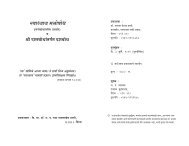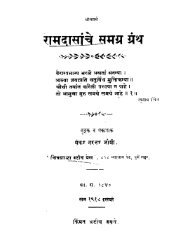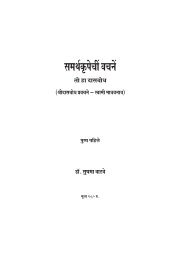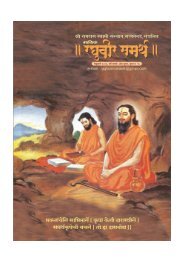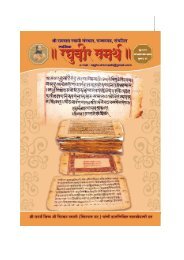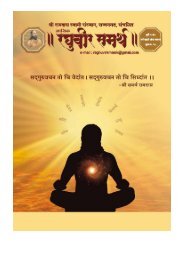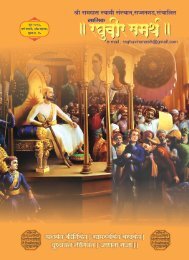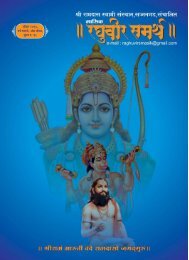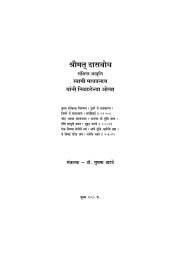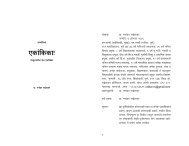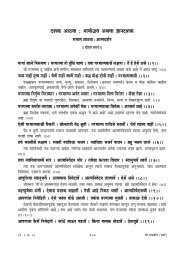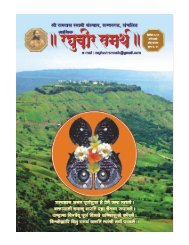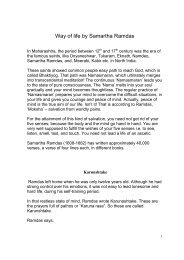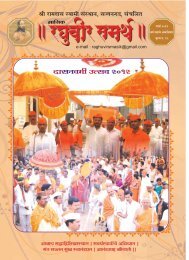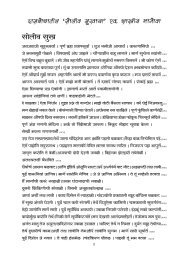THE DASBODHA BY: SADGURU SHREE SAMARTH RAMDAS ...
THE DASBODHA BY: SADGURU SHREE SAMARTH RAMDAS ...
THE DASBODHA BY: SADGURU SHREE SAMARTH RAMDAS ...
You also want an ePaper? Increase the reach of your titles
YUMPU automatically turns print PDFs into web optimized ePapers that Google loves.
either the state of duality or any other contrary state. We are in the habit of saying that Atman<br />
doesn’t ever accept either of the states because we unfortunately live and understand only the<br />
kingdom of duality otherwise in reality the Atman neither accepts nor rejects any state, it is too far<br />
beyond all this play of words to fall pray to any adjectives or superlative explicative. It is therefore<br />
never too late to discard the pride of the body and mind as the fruit of this highly difficult exercise<br />
is the implicitly blissful Atman.<br />
Atman is the most complete entity in the entire universe. It is the only<br />
thing which is devoid of any describable properties. We know all the things and call them so<br />
because we are in the habit of knowing by the properties whereas the Atman doesn’t know anything<br />
like properties or a lack of it, this state of lack of properties is beyond our imagination where the<br />
Atman resides in its most blissful state. Upanishads say, “You are that” or “You are the Brahma”. If<br />
one is capable of reaching all the three states in this Great dictum of the Upanishads and leaving<br />
them behind one reaches the Atman which is again blissfully unaware of anything different from it.<br />
By this Shree Samarth means that if you can conquer the “You” deeply hidden inside the obvious<br />
you, the “Sense of time denoted by the fact that you are” and even the state of “Brahma” then you<br />
are destined for the one and the only Atman with which you become unified for ever. We have to<br />
remove the baseless belief that we are the live forms from which the God or the Parbrahma is<br />
something entirely different to reach that state of the Parbrahma by insistently telling ourselves that<br />
I am nothing but the Atman and hence the Parbrahma. To achieve this one has to consistently<br />
believe all the time all the while that I am the Parbrahma into which this “I” has to be dissolved.<br />
Once this is achieved there is thus no place for any difference between you and the Parbrahma for<br />
ever.<br />
Shree Samarth now tells the gist of what he has stressed upon in this<br />
samas. One is constantly engulfed by the illusion that I am this body and the mind inside it and<br />
hence I am different and independent (The feeling of difference indeed leads to dependence!) is<br />
untrue and the only truth is that the worshipper and the God are no two different entities but two<br />
sides of the same coin. Total submission to the God forgetting everything else forever is the key to<br />
eternal bliss and the worshipper when he gets this key always likes to have it with him till infinity<br />
for the unending bliss it yields despite preferring to call himself as only the other worshipper of the<br />
Almighty, knowing from within that he has finally united with the God or the Parbrahma. He may<br />
get this key by attainment of the real knowledge or by total submission to the God or by any of the<br />
other types of worship described hitherto, but the opened corridors are of eternal bliss and nothing<br />
else. Shree Samarth says this but yet mentions that the worship by total submission to the God is by<br />
far the best for obvious reasons as it can be performed only after you have been able to attain the<br />
real knowledge and are prepared to pursue further for the Parbrahma. In fact Shree Samarth says<br />
that though you will get to the God by other types of worship as well you can never be blissfully<br />
unified with him forever without your total and complete submission to the God. He warns that<br />
without it you may have to undergo the dreaded cycle of birth and death again and again. He also<br />
tells that the type of Mukti it bestows upon you is the most complete one which remains there even<br />
at the time of the wholesome destruction of the universe. The other three types of Mukti are liable<br />
to be destroyed at that time. He mentions that the first type of Mukti is found in getting the constant<br />
companionship of people amongst whom the God resides with a describable form of life, in the<br />
second type you get so close to this live form of God that the Almighty carries you in some form<br />
everywhere he goes, in the third type you almost become a demigod or a very affable and most<br />
preferred servant of the God (Service of any kind to anyone is placed on a very high pedestal by the<br />
religion), the fourth one is the most complete one wherein you lose the sense of the body, the mind



